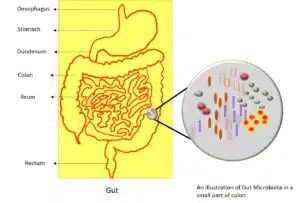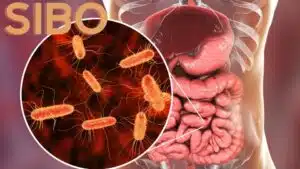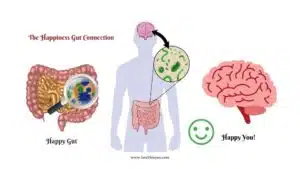Why Is Proper Digestion Important?
You need energy and nutrients to survive, and the digestive system is the main supplier. When you eat food, the digestive system breaks it down into smaller particles that get absorbed into your bloodstream.
The digestive system consists of the esophagus, stomach, liver, gallbladder, pancreas, and intestines. The stomach breaks food into smaller particles. The stomach, gallbladder, and pancreas secrete digestive enzymes to break food into smaller components like carbohydrates, fats, and proteins. Then, the food enters the small intestine, where nutrients are absorbed into the bloodstream. The blood distributes these nutrients to all cells in the body as a fuel for energy production. Amino acids produced during digestion are the building blocks for proteins in the body. [2]
Proper digestion is a key step in energy production and enhancing your immunity. Additionally, without proper digestion, you might experience discomfort, abdominal pain, cramps, bloating, and other symptoms of indigestion. It can also lead to an imbalance in intestinal flora and nutritional deficiencies, including vitamin and mineral deficiencies.
5 Common Digestive Issues
As mentioned earlier, millions of people all over the world have digestive issues, and these are more common than you think. Here, we will discuss the top 5 digestive issues that can affect your digestion.
1. GERD
Gastroesophageal reflux disease or GERD is a condition in which your stomach acid is repeatedly flushed back to the food pipe (esophagus). Stomach acid and undigested food particles irritate the lining of the esophagus. GERD presents with:
- Heartburn, which worsens with eating
- Stomach pain or chest pain
- Difficulty swallowing
- Backflushing of food (it gives a bitter taste in the back of your mouth)
- A feeling of a lump in the throat
Associated symptoms of GERD include cough, asthma, and vocal cord problems.
2. Peptic Ulcers
Ulcers are sore areas in the lining of the stomach or duodenum. When you eat food, the stomach releases acids to digest food. The stomach has a mucosal lining and a few enzymes that protect it from stomach acids. When you eat unhealthy foods, this protective mucosal lining is damaged. An imbalance between protective enzymes and stomach acids leads to stomach ulcers. Ulcers are most commonly caused by a bacteria, H. pylori. In severe conditions, these ulcers can bleed and cause perforation.
Symptoms of peptic ulcers include upper abdominal pain, nausea, vomiting, blackish stools, weight loss, chest pain, and heartburn.
3. Constipation
Constipation is a condition in which a person has infrequent bowel movements and difficulty passing stools. It usually occurs when excessive water is absorbed from the intestines, resulting in dry and hard stools. The most common causes of constipation are unhealthy diet, dehydration, lack of exercise, medications, pregnancy, and a lifestyle change. Dietary fibers play an essential role in the prevention of constipation. [3]
4. Irritable Bowel Syndrome (IBS)
IBS is a condition characterized by altered bowel movements and abdominal discomfort. It occurs due to hypersensitivity of nerves around the gastrointestinal tract. IBS presents with cramping, abdominal pain, mucus in stools, bloating, a feeling of fullness, and bloating. The patient can have diarrhea and constipation alternatively.
5. Hemorrhoids or Piles
Hemorrhoids or piles are swollen veins at the lower end of your gastrointestinal tract (rectum) that bleed. Hemorrhoids can be internal or external. Internal hemorrhoids cause painless bleeding when you pass stools. Bright red blood spots on toilet paper are indicative of internal hemorrhoids. External hemorrhoids cause irritation, pain, bleeding, and swelling around the anus. When blood gets pooled in external hemorrhoids, thDigestive Enzyme supplementsey become thrombosed and cause severe pain, inflammation, and lump around the anus.
Constipation worsens pain and bleeding associated with hemorrhoids. Proper digestion and a healthy diet are critical for the prevention of hemorrhoids.
Types of Digestive Supplements
When it comes to digestive health, you cannot have “one size fits all” supplements. There are various dietary supplements to help your gut improve digestive functions. These supplements may help improve digestion, gut microbiota, bowel movement, and dietary habits.
Let’s explore different types of digestive supplements and how they work. And next we provide tips on how to choose the best supplements for digestive health.
1. Digestive Enzyme Supplements
Supplements for digestion from Raw Science help your gut break down food to produce nutrients for the body. These supplements contain enzymes like protease to break proteins, lipase to break down lipids, amylase for starch, and lactase to digest dairy products.
2. Probiotics and Prebiotics
Probiotics are critical for maintaining gut health. Probiotic supplements remove unwanted and harmful bacteria and regulate gut flora. These supplements may reduce the symptoms of various gut problems, improve immunity, and regulate weight.
Probiotics combined with digestive enzymes provide the best combination. Probiotics support your overall health, while digestive enzymes take good care of digestive functions.[4]
Prebiotics are the food that feeds good bacteria in your gut to promote gut health. These are fibers that prevent various gut issues.
3. Vitamin Supplements
Vitamin supplements contain vitamins C, D, E, and beta-carotene to regulate balance in the gut. These vitamins have anti-inflammatory and immuno-protective properties. Vitamin C enhances the production of short-chain fatty acids that act as protective barriers for the intestines. [5]
4. Colon Cleansing Supplements
Colon cleansing supplements can detoxify your body and remove all toxins. They have various laxatives that improve gut motility and the natural response of the body to toxins. [6] Additionally, colon cleansing supplements prevent constipation and bloating.
As we can see above different types of digestive health supplements are available, so which one to take, and how to select the best supplements for digestive health.
How to Choose the Best Supplements for Digestive Health?
When choosing the best digestive supplements, keep the following things in consideration:
1. Spectrum
We recommend you choose broad-spectrum digestive supplements. This means choosing a single supplement that contains various enzymes, vitamins, probiotics, and nutrients to cover all of your body’s needs instead of choosing plenty of different supplements. When choosing digestive enzyme supplements, ensure that they contain enzymes like protease, cellulase, lipase, amylase, and lactase.
2. Naturally Formulated
When choosing the right digestive supplement, opt for a natural formulation. Try to avoid artificial colors, sweeteners, and flavours, as they are harmful to your gut health.
3. Safety
Always look for research-backed supplements. Research the ingredients, their formulation, and relevant details to ensure safety and efficacy. Check for the manufacturer as a good manufacturer fulfills standard criteria to manufacture a supplement. You should check what experts and nutritionists say about the efficacy of those supplements.
Raw science fulfills all of those requirements and provides the best digestive supplements for digestion. These supplements contain a blend of all enzymes, natural vitamins, bromelain, papain, lipase, lactase, and alpha glucosides.
Do Digestive Supplements Work?
Although digestive supplements promise to fix all problems in your gut, you might think but do they really work? Let’s read what people say after taking digestive supplements:
1. Kristen
Digestive enzymes have revolutionized my digestive health, providing incredible benefits that have positively impacted my overall well-being. These enzymes have significantly improved my digestion, alleviating bloating, gas, and discomfort after meals. They break down complex food molecules, enhancing nutrient absorption and leaving me feeling lighter and more energized. Additionally, digestive enzymes have allowed me to enjoy a wider variety of foods without the fear of intolerances, making them an essential part of my daily routine. With their natural composition, convenience, and remarkable results, I highly recommend digestive enzymes to anyone seeking a safe and effective solution for digestive issues.
2. Jamo
This product worked very well to improve my gut health. It helped to regulate my bowel movements and reduce gas/bloating. However, I did not like how it changed my body odor. The pills have a very distinct smell which I think may be due to the annise powder listed in the ingredients. While taking them, I noticed my body odor was more pungent than usual. I did some research and found that this is normal when initially taking digestive enzymes as it could be detoxing the bad bacteria out of the body while introducing the good bacteria. This may have changed if I continued using them but after two weeks with no change, I decided to discontinue using them. It’s summertime and I just can’t handle the odor. I would still recommend them for the positive benefits they offer: eliminating gas/bloating and regulating bowel movements but it just did not go well with my body chemistry.
3. Megan D.
So, I’ve been taking this vitamin for about a month now and I absolutely love how it makes me feel and how it’s working. In the beginning, I only took one a day then found out you’re supposed to take 2 lol I take 1 before I eat in the AM and 1 in the evening after work. I DO NOT feel as bloated as I used to. I have regular bowel movements. It doesn’t take hours to go to the bathroom anymore which I like because I don’t feel heavy after eating anymore. And I feel it has allowed me to maintain/lose a little weight. It’s a capsule that’s not too big and easy to take. I have not experienced any side effects that I know of either. And oddly, my cycle has improved a bit since taking these.
Conclusion
To conclude, proper digestion is critical for the maintenance of your overall health. An optimal digestive system is key to a stronger immune system. If you don’t take good care of your digestive system, you may have a weakened immune system, resulting in various diseases. Digestive supplements may help improve digestive functions and immunity. Always consult a healthcare professional before starting any supplement regimen to prevent any side effects.
References
- FastStats – Digestive Diseases. Published 2024. Accessed January 16, 2024. https://www.cdc.gov/nchs/fastats/digestive-diseases.htm
- Patricia JJ, Dhamoon AS. Physiology, Digestion. Nih.gov. Published September 12, 2022. Accessed January 17, 2024. https://www.ncbi.nlm.nih.gov/books/NBK544242/
- Diaz S, Bittar K, Hashmi MF, Mendez MD. Constipation. Nih.gov. Published November 12, 2023. Accessed January 17, 2024. https://www.ncbi.nlm.nih.gov/books/NBK513291/
- Diaz S, Bittar K, Hashmi MF, Mendez MD. Constipation. Nih.gov. Published November 12, 2023. Accessed January 17, 2024. https://www.ncbi.nlm.nih.gov/books/NBK513291/
- Pham VT, Dold S, Rehman A, Bird JK, Steinert RE. Vitamins, the gut microbiome, and gastrointestinal health in humans. Nutrition Research. 2021;95:35-53. doi:https://doi.org/10.1016/j.nutres.2021.09.001
- Gelberg HB. Pathophysiological Mechanisms of Gastrointestinal Toxicity. Elsevier eBooks. Published online January 1, 2018:139-178. doi:https://doi.org/10.1016/b978-0-12-801238-3.10923-7
Dr. Shama Nosheen
Disclosure – This is a sponsored post. The product belong to a third party, and we have neither used nor endorsed any products. The views expressed are of the sponsor/author/third party and not of Healthieyoo’s editorial team. The testimonials are provided by the sponsor/ third party and not collected by Healthieyoo. We disclaim any and all liability to any party, person, company, or product for any direct, indirect, implied, punitive, special, incidental, or consequential damages arising either directly or indirectly due to the use of content published in this article. The publishers of this website take no responsibility for any health issues, personal injury, death, disability, or any other harm due to the content on our website or any advice or opinion expressed on our website. Please consult your healthcare professional before making any decision related to your health. Please also read our medical disclaimer”.
Related Posts


Symptoms of SIBO vs IBS, hydrogen vs methane SIBO symptoms and Hydrogen sulfide SIBO


Chronic Idiopathic Constipation – Can A Healthy Lifestyle Help?



